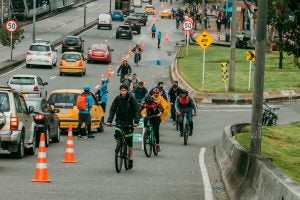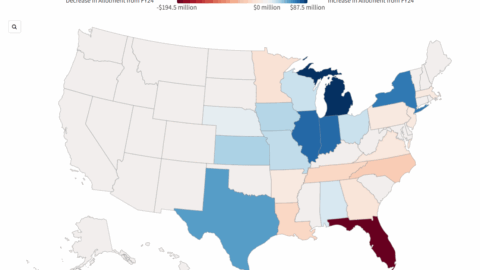
Why now is the moment for cities around the world to act decisively on air pollution
Sarah Vogel, Ph.D., is Vice President for Health.
This is the second in a series of Global Clean Air blogs on COVID-19 and air pollution. EDF scientists and program experts will share data about pollution levels during quarantine from a local and global perspective, and provide recommendations for governments and companies to Rebuild Better.
Around the world, we’ve seen dramatic improvement in air quality as a result of the response to COVID-19. While it’s come from an artificial and unwanted brake on the global economy, it’s drawn renewed attention to the devastating impacts of outdoor air pollution.
As many large cities around the world emerge from lockdown, city authorities need to act decisively to prevent air pollution rebounding and even exceeding pre-COVID-19 levels. That was the conclusion of participants in a “Clear Skies to Clean Air” webinar I moderated last week by the Organisation for Economic Co-operation and Development World Wildlife Fund and Environmental Defense Fund, in collaboration with the World Bank.
The improvements in air quality seen during the COVID-19 lockdown have shown individuals and policymakers what is possible and could open the door to reinvigorated efforts to address pollution.
London and Bogotá demonstrate clean recovery strategies
The webinar heard from policymakers on the front lines of addressing air pollution: Shirley Rodrigues, Deputy Mayor of London, with responsibility for environment and energy; and Claudia López, Mayor of Bogotá, Colombia.

Cities need devolved powers if they are to address local air pollution, argued Rodrigues: “We can’t have a centralised approach … Citizens deal with their local authorities, mayors know what is needed in their cities. Devolving powers, alongside funding, is absolutely critical so we can push the electrification agenda and the reclamation of roads, so we can avoid a car-based recovery.”
As well as discussing ongoing efforts that London has been making to encourage cycling and walking, Rodrigues also described how the city has been working with EDF to develop “hyper-local” air monitoring, which can inform a better understanding of how pollution is disproportionately affecting low-income communities. “Unless you have the data to really understand where the hotspots of pollution and hotspots of inequality [overlap], you can’t target your resources and your efforts.”
López explained how Bogotá has responded to the pandemic by accelerating existing efforts to encourage low-carbon and cleaner forms of urban transport, such as adding an additional 80 km of cycle lanes to the existing 560 km network and making greater provision for pedestrians.
“This is not going to be temporary – we’re going to take advantage of the pandemic to speak more to this agenda for clean and green transportation,” she said.
She also noted the importance of working cooperatively with adjacent local authorities: “We won’t be able to achieve our goals if surrounding municipalities don’t share our vision and our goals, because air doesn’t recognize administrative boundaries.” Similarly, clean transit systems need to be built at the regional level if they are to be effective, she added.
Targeted policy interventions by World Bank & EU
Karin Kemper, Global Director, Environment, Natural Resources and Blue Economy Global Practice at the World Bank, catalogued some of the impacts from toxic air: 7 million deaths from air pollution each year; a cost to the global economy of around $5.7 trillion in 2016 alone; a disproportionate effect on the poor; and the exacerbation of susceptibility to COVID-19.
“Fortunately, the evidence shows that there are many actions and measures we can take to improve air quality,” said Rodolfo Lacy, Director for the Environment Directorate at the OECD. The pandemic, he said, “has demonstrated the potential for targeted mitigation efforts to generate rapid and significant improvements, and the accompanying economic benefits in terms of improved health are quite relevant.”
He added that the OECD has a number of policy recommendations in this area: existing air pollution regulations are enforced; any COVID-19 responses do not worsen air quality issues; road space is reallocated to pedestrians and cyclists; low-emission zones in cities should be expanded; and air quality monitoring networks should be extended and upgraded.
“One of the things about air pollution is that it really lends itself to policy interventions,” Kemper added. In addition to the OECD recommendations, she recommended policies that aim to reduce emissions of black carbon – which has the added benefit of helping to mitigate climate change – and the removal of subsidies on fossil fuels, which currently amount to $4.7 trillion each year, or 6.5% of global GDP.
“This may be the moment, when fossil fuels are naturally cheap, to repurpose subsidies and use them for other things, such as in the health sector or education,” she said.
“Finally, carbon pricing and pollution charges are really important,” she added, noting that the World Bank has been working with Mexico and Colombia to design carbon pricing systems.
Daniel Calleja Crespo, Director General for Environment for the European Commission spoke about the massive “Next Generation EU” Plan, to ensure the economic recovery from COVID-19 is sustainable, even, inclusive and fair for all member states. To repair and prepare for the next generation, the Commission will issue 30-year bonds totalling 750 billion euros ($842 billion USD), for investing in energy efficiency in buildings and infrastructure, renewable energy development and storage, carbon capture and sequestration, biodiversity and health. He said, “This plan is based on the ‘Green Oath,’ which abides by the principle, ‘do no harm.’ This plan will create resilience and a circular economy for future generations.”
The new plan goes farther than its previously announced European Green Deal. This growth strategy transforms the EU into a modern, resource-efficient, cleaner and competitive economy where there are no net emissions of greenhouse gases by 2050, economic growth is decoupled from resource use, and no person and no place is left behind.












